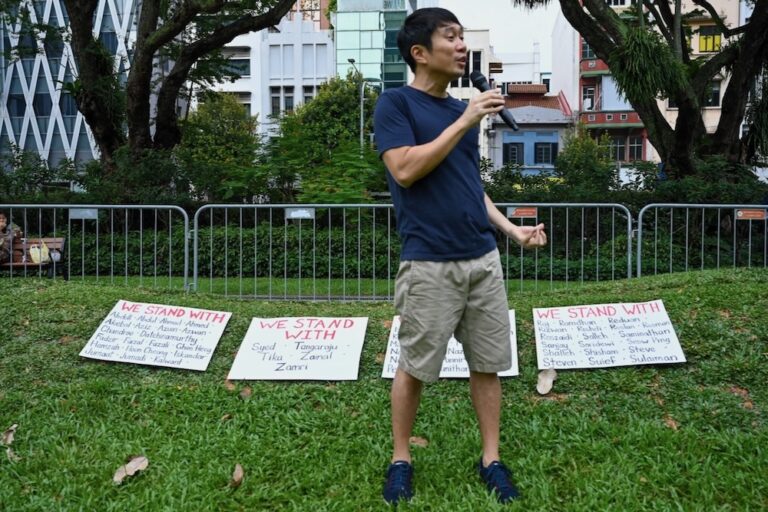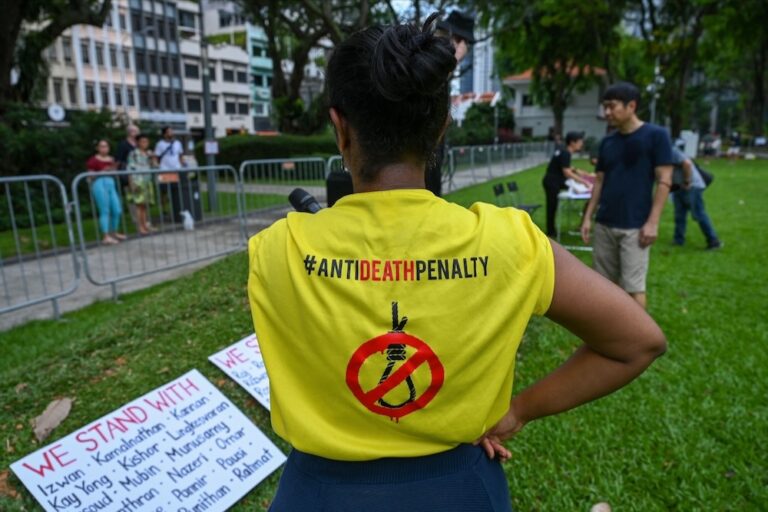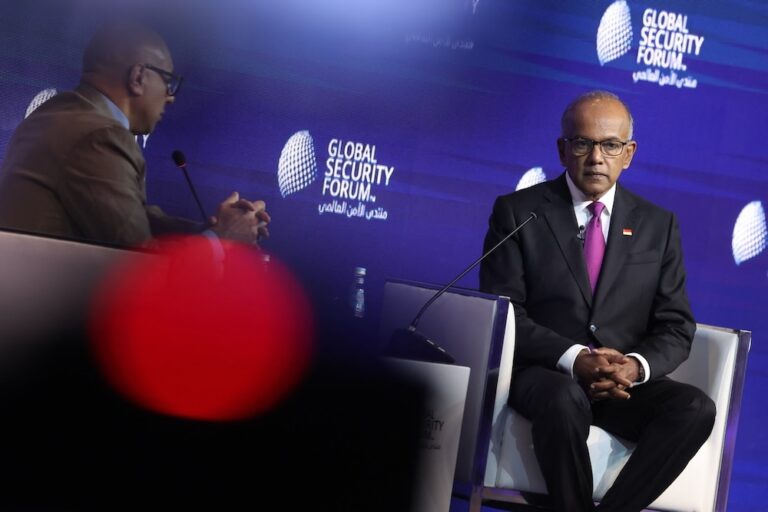Singapore's new law grants government ministers the power to decide what is true or false – and to remove content accordingly.
This statement was originally published on ipi.media on 9 May 2019.
Lawmakers in Singapore yesterday passed a law extending the country’s web of oppressive media laws to online journalism. The country’s new, sweeping anti-“fake news” law will allow government ministers to order the removal or correction of online content they deem false and against the public interest.
Singaporean journalists have expressed fury and dismay at the vast executive powers granted by the Protection from Online Falsehoods and Manipulation Bill, which was originally tabled in April, which claims an imperative to protect society from broadly defined “malicious” online lies.
The gravity of this law can hardly be overstated, Kirsten Han, founder and editor-in-chief of Southeast Asian online platform New Naratif, indicated in a recent interview with the International Press Institute (IPI). “It really could kill independent news sites in Singapore, who are already financially struggling as it is.”
Singapore’s government has rejected suggestions that the law would be a tool of arbitrary repression, arguing that courts will remain the final arbiter of what is true or false. In practice, however, the lengthy and problematic appeals process is likely to deter journalists from appealing ministerial orders to remove or modify content. “For a lot of people, being an arbiter of truth in the first and second instance is bad enough”, commented Han.
The “draconian, totally arbitrary” law will also conjure fear among journalists who work for non-government organizations, Singaporean historian and coordinator of Oxford University’s Project Southeast Asia Thum Ping Tjin told IPI.
He added: “Any minister can simply decide it’s false. This is Orwellian.”
Broad legal definitions and sweeping scope
The law allows government ministers to order the removal or modification of online content they consider to be false and where they believe such measures are “in the public interest”.
But as Thum pointed out, the definition of “public interest”, in clause 4 of the law, is broad enough to “be literally anything”. He explained: “If you criticize the government, even if it’s a legitimate criticism, they can argue that criticism affects public confidence in the government. This effectively criminalizes all criticism of the government.”
And that’s just half of the problem. It is up to the minister to decide whether the content is false in the sense of being “false or misleading, whether wholly in part, whether on its own or in the context in which it appears”, according to what Thum described as the measure’s “ludicrously broad” definition. The vagueness and inherent subjectivity – government officials deciding what is true and false – is an invitation to censorship.
Beyond criminalizing criticism, the law also contains mechanisms to override professional confidentiality agreements. Under the law, a doctor could be forced to disclose private details about a patient to assist the government with an investigation into an alleged case of “fake news”.
Inaccessible appeals process
While these extensive grounds for prosecution are alarming enough, the appeals process foreseen by the law is expected to be “excruciatingly painful”, Thum said. The publisher of the impugned content can appeal to the relevant minister but must first comply with the removal or correction order. And only after the minister issues a ruling on the appeal can the publisher file an appeal in the court system, a process that could last years. In the meantime, the original content remains removed or modified. So, as Han notes, in a country “where people are already a little bit afraid and very reluctant to take on the government”, many independent journalists will wonder – what is the point?
“I can’t afford the fines”, said Thum. “But I also can’t afford to go through the appeals process, which can cost between $5-20,000. I’ve already been targeted by the government, so I don’t know if they’ll use the law against me, but it’s at the back of my mind. It’s going to cause a lot of fear.”
Han, who was previously targeted by the government for starting an independent news site, is also uncertain about the future. “The bill is so wide-ranging. We don’t know how they’re going to use it. There’s no way that I can change the way I work to be safe. The issue is that nobody is safe anymore. They have the power. They have the mainstream media.”
A tightly controlled media environment
Indeed, government-approved shareholders dominate Singapore’s mainstream print media. Newspapers are forced by licensing requirements to grant managerial shares to the government, thus allowing the state to influence key editorial appointments, like editor-in-chief, at major newspapers.
Due to this regulatory framework, the Internet offered a safer haven for alternative and independent Singaporean news outlets. “It was seen as this freer space”, said Han. “But, in recent years, we have seen people charged and even convicted for things like contempt of court, or things they said on Facebook.”
One such case is that of Terry Xu, editor of socio-political website The Online Citizen. Xu currently faces criminal defamation charges for publishing an article that alleges corruption among high-ranking Singaporean cabinet ministers. Criminal defamation violates international norms on freedom of speech, which indicate that defamation should remain in the civil courts and not be punishable by imprisonment. Intergovernmental human rights bodies have called for the abolition of criminal defamation.
In Singapore, an authoritarian web of defamation, sedition and contempt laws provide a legal basis to “supersede the right to assembly and free speech”, said Thum. One notable example is the archaic Sedition Act, which criminalizes speech that “[brings] into hatred or contempt or [excites] disaffection against” the government, or “[promotes] feelings of ill-will and hostility between different races and classes”. Discourse that arouses “discontent” between races or “disaffection” against the government is punishable by up to three years in prison.
In the same vein, Singapore’s Constitution permits the restriction of press freedom in the interests of “racial and religious harmony” and “public security”. These opt-out clauses have been exploited in laws such as the Public Order Act 2009, which criminalizes public “processions” or “assemblies” of one or more person that do not have prior state approval.
‘There is just so much fear’
Singapore has a pervasive history of suppressing press freedom. Amos Yee, a teenage blogger who was imprisoned in 2016 for “[wounding] religious feelings” in online posts that criticized and mocked the government, eventually found asylum in the United States.
Thum has a similar story. “I’ve come back to Singapore several times now to try and make a difference to my country. And each time I’ve been driven out by the government. It’s just so frustrating. So many good people have been driven out, and that’s what they want”.
The introduction of controversial mis- and dis-information regulation is a global trend, from Egypt’s authoritarian cyber laws, to the White Paper on Online Harms tabled recently in the United Kingdom.
Yet even on this spectrum of controversial legislation, Singapore stands out. Laws in other countries tend to be more targeted, circumscribed, and place power – at least symbolically – in the hands of an independent body. The most important element, said Tjin, is a clear appeals process. Legal avenues must be “accessible to ordinary citizens and far less costly, without a politician as the first and second arbiter of [enforcement].”
Lawmakers approved the bill yesterday by a vote of 72 to 9. Although the opposition party that controls the remaining six seats had declared its opposition to the law, they are powerless against the PAP in parliament. Public reaction has also been limited. As Han indicated, “criticism from Singapore’s general public has been – as usual – very subdued. There is just so much fear”.



